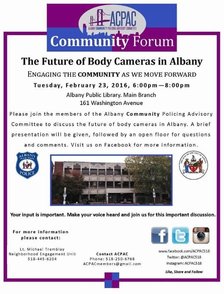Public event to discuss the future of police body cameras in Albany
 The Albany Police Department and the Albany Community Policing Advisory Committee are holding a public event to discuss the use of body cameras this Tuesday, February 23 at the Albany Public Library main branch at 6 pm.
The Albany Police Department and the Albany Community Policing Advisory Committee are holding a public event to discuss the use of body cameras this Tuesday, February 23 at the Albany Public Library main branch at 6 pm.
Blurbage: "Please join the members o the Albany Community Policing Advisory Committee to discuss the future of body cameras in Albany. A brief presentation will be given, followed by an open floor for questions and comments. ... Your voice is important. Make your voice heard and join us for this important discussion."
APD chief Brendan Cox will be there to give a presentation, according to an APD press release. Last fall the feds announced the city of Albany was getting a grant to help cover the cost of adding officer body cams.
Body cameras for police officers are one of those things that feel inevitable. Between the increased push for better evidence about what happens (or doesn't happen) during police-community interactions, and the falling price of the tech, it's not hard to see an eventual future where every police situation is filmed.
But. Technology is a tool, not necessarily a solution. That's one of the points made by an interesting review of body cams by the think tank Data & Society. A clip from a shorter piece about the review in The Atlantic -- "It's Not Too Late to Get Body Cameras Right" -- by two of its authors, danah boyd and Alex Rosenblat:
The temptation of technology as an accountability tool is not new, but accountability is not done by technology. Accountability is achieved by people and systems using tools like technology as part of their bureaucratic processes. There is effectively a global consensus that body cameras are a good thing to have because everyone has a different idea of what they're agreeing to, a different model of appropriate bureaucracy. The bureaucratic and political battles over policies of use, access, and retention are not yet resolved, and they are significant. Who gets to see the footage, and in what circumstances, will matter. The features and capabilities of the technology matter. What happens when the camera reveals more about what was in the officer's scope than what they could physically see at the time, especially at night? Or when cameras get additional features, like heat sensors? Even on basic practical questions, such as whether and when officers or the public should see the footage, there is no consensus.
So, there's a lot to think about to think about on the topic. And like almost all tech issues, it eventually comes back to how people act and the choices they make.
Say Something!
We'd really like you to take part in the conversation here at All Over Albany. But we do have a few rules here. Don't worry, they're easy. The first: be kind. The second: treat everyone else with the same respect you'd like to see in return. Cool? Great, post away. Comments are moderated so it might take a little while for your comment to show up. Thanks for being patient.
... said KGB about Drawing: What's something that brought you joy this year?